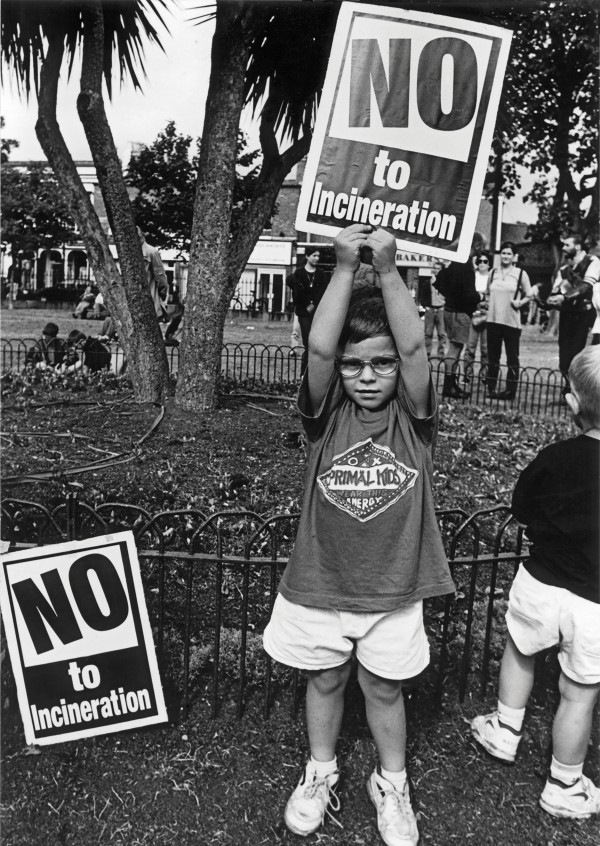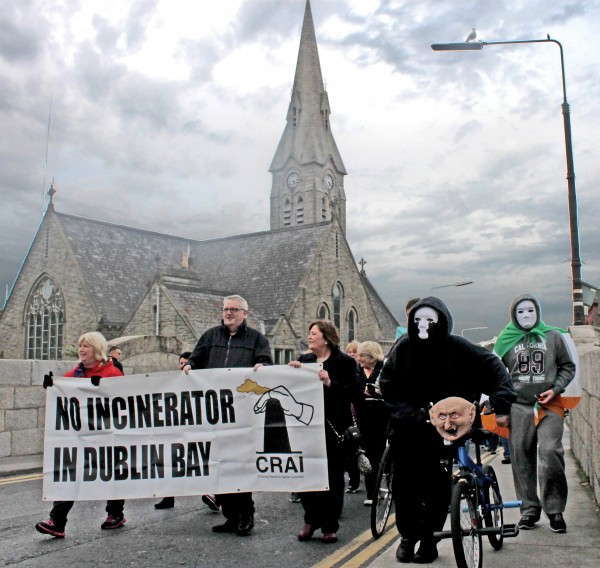
Pictured Above: A young anti-incinerator protester back in the summer of 1995. Photo: Kim Haughton.
Combined Residents Against Incineration (CRAI) remain steadfast in their resolve against the Poolbeg Incinerator that is currently under construction. In a recent meeting they reiterated their opposition and have outlined plans for fundraising to launch a legal challenge. It is understood that €80,000 is needed at the outset to launch a challenge against the incinerator.
Frances Corr of CRAI remains adamant that the Incinerator has already flouted its licenced position as “it was originally given planning permission with the condition that it was to take Dublin-only waste.” Under CRAI’s calculations there is not enough waste from Dublin and it would need waste from other regions. Dublin has now been subsumed into a new regional waste regulatory area called EASTERN-MIDLANDS REGION. Therefore, it may be argued that the Poolbeg Incinerator will be in breach of its original remit de facto.
In addition, Corr also believes that the new Community Gain Fund (CGF) is not being calculated appropriately. When final planning permission was given to the Poolbeg Incinerator by An Bord Pleanala in 2007, it included a condition that a Community Gain Fund should be established for the local community. This money would be provided by the American operator of the plant, Covanta, who are the parent company of Dublin Waste to Energy Ltd.
“The fund should be equivalent to 3% of the capital costs of the Waste to Energy facility. The plant has been publicised as having a €500 million build price,” says Corr. “In that case €15 million should be made available to the CGF.”
However, Dublin City Council has estimated an initial €10.3m will be made available over the three-year construction phase. From the first year, following commissioning of the plant and thereafter, an annual contribution will be required starting at €1 per tonne of waste burned. This is supposed to rise in accordance with the consumer price index.
The Poolbeg incinerator is estimated to burn between up to 600,000 tonnes of waste per year. When the plant starts operating, the CGF should theoretically receive a minimum of €600,000 per year. CRAI have called on local groups and councillors to boycott the committee and reception of its funds. The CGF aims to support facilities and services which would be of benefit to the community in the general catchment area.
The fund will be administered by a Community Gain Liaison Committee to liaise between Dublin City Council and the local community. The committee will have 10 members. That includes an independent chairperson, three local community representatives, three elected members of Dublin City Council, two officials of Dublin City Council and one representative from the operators of the waste to energy facility. Interestingly, the independent chairperson shall be nominated exclusively by the Chief Executive of Dublin City Council.
Claire Byrne, Chris Andrews, and Kieran Binchy had put themselves forward as the elected DCC reps for first term; Dermot Lacey, Paddy McCartan, and Frank Kennedy for the second term.
The three local community representatives will comprise of one from eligible community groups in the area to nominate one representative for consideration, another from eligible education/sports/arts/environment/culture groups and one from the business sector. Businesses are invited to submit an application form nominating themselves, or another business in the area.

Pictured Above: A much more recent protest against the same issue.
Dublin City Council sought applications for the Community Gain Liaison Committee from early March and declared a closing deadline of 31st March 2015. The positions have not been finalised.
By Ferg Hayden

